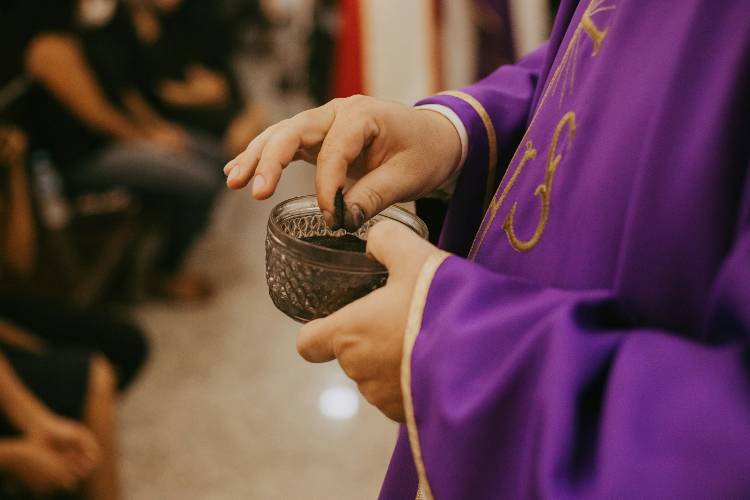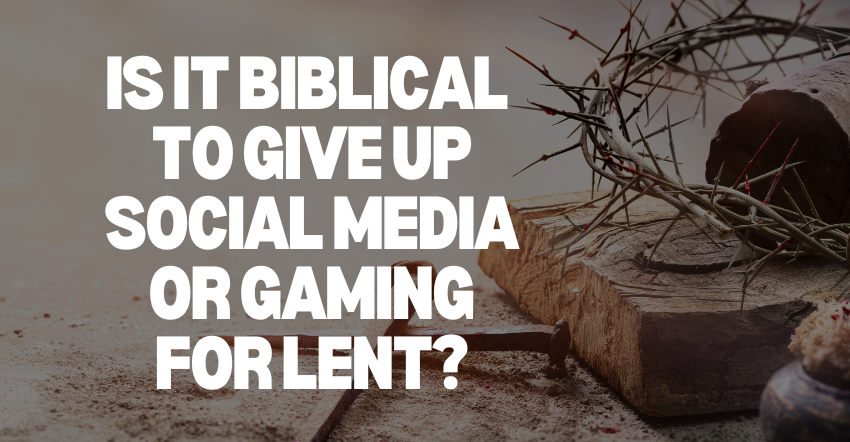Hey there, fellow seekers of spiritual and digital enlightenment! Today we’re going to tackle a question that’s been buzzing around the interwebs and in the minds of many Christians:
Is it biblical to give up social media or gaming for Lent?
Let’s embark on this journey together and explore Lent, the Bible, and our digital distractions, starting with the backstory of what Lent is and where it came from…
What is Lent?
Lent, my friends, is not just that time of year when you debate whether to give up chocolate or caffeine (or both if you’re feeling adventurous). It’s a season of reflection, repentance, and preparation leading up to Easter Sunday. Traditionally observed by Christians around the world, Lent lasts for 40 days (excluding Sundays) and mirrors Jesus’ 40 days of fasting in the wilderness.
Is Lent in the Bible?
The term “Lent” itself is not explicitly found in the Scriptures. However, the concept of fasting and repentance certainly is. Throughout both the Old and New Testaments, fasting is mentioned as a means of drawing closer to God, seeking His guidance, and repenting of our sins.
What are the origins of Lent?

While the exact origins of Lent as we know it today are somewhat murky, historical records and writings from early Church fathers shed light on its development.
In the earliest days of Christianity, fasting was a common spiritual discipline observed throughout the year, not just during Lent. These fasts were seen as acts of solidarity with Jesus’ suffering and as a means of spiritual purification.
The period leading up to Easter Sunday became a focal point for intensified fasting and penance. This period, eventually formalized as Lent, was viewed as a time of preparation for the celebration of Christ’s resurrection. The 40-day duration of Lent mirrored Jesus’ 40 days of fasting in the wilderness, as recounted in the Gospels.
Because Lent is not specifically described or prescribed in the Bible, Lenten practices and observances have developed through church history and varied in different cultures, traditions and denominations.
In some Christian traditions and churches, Lent is not observed at all.
In other Christian traditions and churches, it’s observed with special Wednesday Lenten services beginning with Ash Wednesday.
What does “Lent” mean? Where did the word come from?
The word “Lent” finds its roots in Old English and other Germanic languages. It is derived from the word “lencten” or “lengten,” which means “spring” or “lengthening of days.” This linguistic connection reflects the season of Lent’s timing in the Christian liturgical calendar, as it occurs during the springtime in the Northern Hemisphere.
When did giving something up for Lent start?

As we said earlier, Lent developed out of the biblical practice of fasting. So, you could say giving something up for Lent started before there even was a “Lent.”
One notable literary work that references the practice of giving something up for Lent is “The Canterbury Tales” by Geoffrey Chaucer, written in the late 14th century. In the “The Canterbury Tales,” Chaucer depicts a group of pilgrims traveling to the shrine of Thomas Becket in Canterbury, England, and sharing stories along the way.
In the “The Parson’s Tale,” one of the tales within “The Canterbury Tales,” the Parson discusses the virtues of penitence and the importance of fasting and self-denial during Lent. While the text does not explicitly mention giving something up for Lent in the modern sense, it reflects the broader theme of abstaining from worldly pleasures as a form of spiritual discipline and preparation for Easter.
Why do people give things up for Lent? (Some bad reasons)
Now, let’s address the elephant in the sanctuary: Some folks view Lent as a spiritual weight-loss challenge or a chance to one-up their friends with their sacrifice du jour. Yes, unfortunately, some people give things up for the wrong reasons:
- Exercise Self-Control. For some people, giving something up for Lent is all about willpower. But following Jesus is not supposed to be about willpower, it’s about God’s power. It’s not about self-control but Spirit-control.
- Pain Pay-Back. Jesus endured excruciating pain on our behalf. He was whipped, beaten, and crucified. Some people feel like making themselves miserable is a way of paying Jesus back for the pain he endured for us. Jesus sacrifice was a gift. We don’t earn points for pain.
- Public Display of righteousness. Nobody’s going to admit this, but some people give something up so they can tell other people how much they’re sacrificing for God. They want to look super-spiritual to their friends.
Jesus addressed this…
“When you fast, do not look somber as the hypocrites do, for they disfigure their faces to show others they are fasting. Truly I tell you, they have received their reward in full. 17 But when you fast, put oil on your head and wash your face, 18 so that it will not be obvious to others that you are fasting, but only to your Father, who is unseen; and your Father, who sees what is done in secret, will reward you.” -Matthew 6:16-18
Why do people give things up for Lent? (Some good reasons)
Now, let’s pivot to the good stuff! Giving something up for Lent isn’t about flexing your willpower or garnering social media likes—it’s about deepening your relationship with God.
Before we received Jesus, we lived by the flesh. Our fleshly desires controlled us.
These fleshly desires include physical desires for food, sex, and sleep. They also include desires for other things like entertainment, security, notoriety, accomplishments, and the appreciation of others.
When we received Jesus, our old self died, and we were filled with the new life of Christ.
Paul writes in Galatians 5:24, “those who belong to Christ Jesus have crucified the flesh with its passions and desires.“
But crucifying the flesh isn’t something we do once and its done. Every day is a battle between our flesh and the Spirit who lives in us.
So, when we give something up for Lent, it is
- A proclamation. We are saying, “I am not controlled by my flesh!” Note that this is not something we should take pride in. It is not us but Christ who freed us from our flesh. Its not even (primarily) a public proclamation, but a proclamation to God and to the devil who wants us to live by our flesh.
- Step of faith. We trust that God will provide what we need, whether that’s energy when we’re not eating, fulfillment if we’re abstaining from some sort of entertainment, or whatever.
- Turning to God. As we’re fasting or abstaining from something during Lent, it is inevitable that we will have cravings. The goal is to use those cravings as a reminder to pray and seek God, whether that’s once or twice a day, once or twice an hour, or once or twice a minute.
- Freeing Time with God. When not eating or gaming or watching TV, we’re going to have extra time we didn’t have before. Woohoo! This is literally a God-send for every one of us who lives an overly busy life. How will you spend this freed up time? Hopefully, its doing something with God – praying, reading the Bible, serving people in need, encouraging people.
So, here we are… after a long journey through context and backstory… let’s get to original question…
Should I give up social media, gaming or screen time for Lent?

Obviously, this is not a command from God found in the bible because a) Lent isn’t mentioned in the bible, and b) there wasn’t a whole lot of social media or gaming happening in biblical times either. (Sorry, no cheat codes here. 😉 )
So, let’s get rid of the word “should” and rephrase the question…
Is it good, right and beneficial to give up social media, gaming, and screen time for Lent?
It depends.
- Are social media, gaming or screen time a huge time suck for you?
- Do you find yourself spending hours doing these things alone?
- When you’re trying to do other things you “have to do,” do you find yourself frequently thinking about your screen, and then taking a “quick break.”
- Is social media, gaming or other screen time the first thing you do in the morning and the last thing you do at night?
- When you’re on social media, gaming, or your screen do you find yourself more anxious, angry, arrogant, or combative?
If you answered yes to any of these questions, can you see how taking a break from social media, gaming, or whatever you do on your screens could be beneficial to you, your relationship with God, and God’s ability to be at work in your life?
On the other hand…
- Do you feel good about the amount of time you spend on social media, gaming, and on your screen?
- Are social media, gaming or screen time an important part of the way you connect with other people?
- When you’re online, do you have an attitude like Christ? One of love, joy, peace, patience… ?
- Can you genuinely say God is at work through you when you’re online?
If this is the case, then why give up what God has redeemed in your life?
Pray and ask the Holy Spirit to guide you.
The reality is, screen time is usually not a black and white issue. Chances are there are times God is at work when you’re online and times when you go off the rails. It may not be an all or nothing decision.
Maybe God will lead you to give up some part of your social media, gaming or online activity.
- Maybe it’s no social media before dinner.
- Maybe it’s no gaming alone.
- Maybe it’s one particular game or app you give up for Lent.
As we wrap up our digital detox journey, remember this:
Lent isn’t a spiritual contest or a guilt trip—it’s an invitation to journey with Jesus more closely.

Whether you’re swiping left on Snapchat or leveling up in Fortnite, may your Lenten sacrifice be a testament to your love for God and your desire to draw closer to Him.
So, go forth, my friends, and may your Lenten season be filled with grace, growth, and the occasional meme-worthy moment.
And keep in mind, fasting of any kind, whether from food or screen time, is not just for Lent.
Comment and Discuss…
- What if anything are you giving up for Lent this year?
Continue reading… 22 Easter Ideas for Church Outreach (events and online)



1 Comment
Greetings from Los angeles! I’m bored to tears at work so I
decided to check out your website on my iphone during lunch break.
I enjoy the information you provide here and can’t wait to take a look when I get home.
I’m surprised at how quick your blog loaded on my mobile
.. I’m not even using WIFI, just 3G .. Anyhow, fantastic blog!